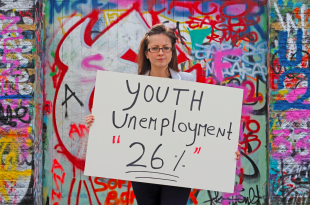Unique Approaches to Combating Youth Unemployment


At the beginning of each month, like clockwork, news organizations will run a story highlighting the latest “jobs numbers.” Typically this brief 10-30 second sound bite will announce the number of jobs created and any change in the unemployment rate—and that’s about it. Perhaps we will hear a more in depth report when there is a major shift or the announcement of a new initiative, but the majority of time reports on economic recovery are boiled down to these two numbers.
I will be the first to admit I had not given more thought to these reports beyond recognizing more jobs added and a reduction in the unemployment rate were good signs of recovery. It didn’t occur to me that certain populations were facing very different numbers—numbers that weren’t improving month after month.
Young workers all over the world are facing an unemployment rates two or three times higher than those of older workers. In the U.S., 15% of workers aged 16 to 24 are unemployed, versus the 7% unemployment among all workers. Some European countries, such as Spain and Greece, are experiencing youth unemployment rates as high as 54%. While the economic recession is a major factor behind these higher rates, the increasing disconnect between higher education and the job skills company's require only exacerbates the issue.
Fortunately, many companies and organizations have taken up the charge to address this growing epidemic, creating innovative solutions to help young people bring their skills to the market.
Adecco, a leading recruitment company and one of the largest providers of HR solutions, has seen the youth unemployment firsthand. This multinational company has offices in many of the hardest hit countries and has witnessed the frustration of unemployed youth as they try to find their place in the professional world. To help combat the issue, Adecco launched the “Way to Work” program.
Comprised of events, job training programs and mentoring, the Way to Work program seeks to encourage, motivate and inspire young people to take the first steps in their career. Each year, Adecco employees take to the streets of their respective communities to deliver career workshops and offer advice. In addition to visiting schools and organizations, the “Street Days” program also involves open houses at Adecco staffing branches and job fairs. The April 30, 2014 Street Day in Spain saw 1,400 employees assisting more than 90,000 youth in one day. Additionally, Adecco offers one-month paid employment at the company to help young people gain work experience. Participants in the employment program have the opportunity to apply to be ‘CEO of the Adecco Group’ and receive mentoring from Adecco CEO Patrick De Maeseneire.
Closer to home here in Portland, Oregon, local nonprofit New Avenues for Youth is tackling both youth unemployment and homelessness, as high rates of youth unemployment can create long-term struggles with stable housing. Their approach to this issue is unique in that their solution also helps sustain the nonprofit’s programs. New Avenues for Youth’s Social Purpose Enterprise Initiative runs nonprofit businesses to provide employment opportunities for youth. The nonprofit runs two Ben & Jerry PartnerShops, an ice cream catering and cart business, as well as a screen printing business. Youth gain real customer service experience and have the opportunity to move into different roles while working for the businesses. Program participants also take part in a job readiness training program to help learn about personal budgeting, interview skills and more.
Youth unemployment is a problem that cannot be solved by laws alone. For example, the recent debate over increasing the minimum wage won’t solve the skills gap issue experienced by many college graduates. More opportunities for real-world experience and training, such as those offered by Adecco and New Avenues, will help young workers gain the vital skills and confidence they need to face the today’s challenging job market.



